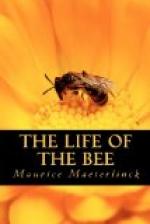And now let us return to the city that is being repeopled, where myriad cradles are incessantly opening, and the solid walls even appear to be moving. But this city still lacks a queen. Seven or eight curious structures arise from the centre of one of the combs, and remind us, scattered as they are over the surface of the ordinary cells, of the circles and protuberances that appear so strange on the photographs of the moon. They are a species of capsule, contrived of wrinkled wax or of inclined glands, hermetically sealed, which fills the place of three or four workers’ cells. As a rule, they are grouped around the same point; and a numerous guard keep watch, with singular vigilance and restlessness, over this region that seems instinct with an indescribable prestige. It is here that the mothers are formed. In each one of these capsules, before the swarm departs, an egg will be placed by the mother, or more probably—though as to this we have no certain knowledge—by one of the workers; an egg that she will have taken from some neighbouring cell, and that is absolutely identical with those from which workers are hatched.
From this egg, after three days, a small larva will issue, and receive a special and very abundant nourishment; and henceforth we are able to follow, step by step, the movements of one of those magnificently vulgar methods of nature on which, were we dealing with men, we should bestow the august name of fatality. The little larva, thanks to. this regimen, assumes an exceptional development; and in its ideas, no less than in its body, there ensues so considerable a change that the bee to which it will give birth might almost belong to an entirely different race of insects.
Four or five years will be the period of her life, instead of the six or seven weeks of the ordinary worker. Her abdomen will be twice as long, her colour more golden, and clearer; her sting will be curved, and her eyes have seven or eight thousand facets instead of twelve or thirteen thousand. Her brain will be smaller, but she will possess enormous ovaries, and a special organ besides, the spermatheca, that will render her almost an hermaphrodite. None of the instincts will be hers that belong to a life of toil; she will have no brushes, no pockets wherein to secrete the wax, no baskets to gather the pollen. The habits, the passions, that we regard as inherent in the bee, will all be lacking in her. She will not crave for air, or the light of the sun; she will die without even once having tasted a flower. Her existence will pass in the shadow, in the midst of a restless throng; her sole occupation the indefatigable search for cradles that she must fill. On the other hand she alone will know the disquiet of love. Not even twice, it may be, in her life shall she look on the light—for the departure of the swarm is by no means inevitable; on one occasion only, perhaps, will she make use of her wings, but then it will be to fly to her lover. It is strange to see so many things—organs, ideas, desires, habits, an entire destiny—depending, not on a germ, which were the ordinary miracle of the plant, the animal, and man, but on a curious inert substance: a drop of honey.*




